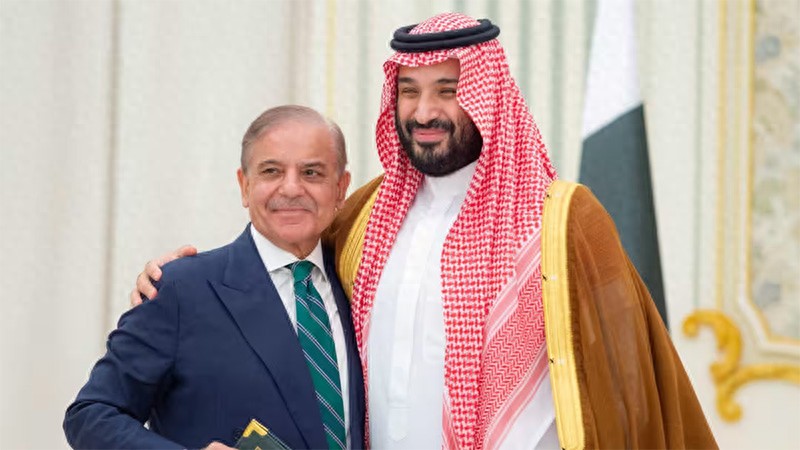【Text by Observers Network, Xiong Chaoran】On September 17 local time, Saudi Arabia and Pakistan formally signed a mutual defense agreement. The agreement stipulates that "an aggression against any one country will be considered an aggression against both countries." Pakistan later confirmed that its nuclear program "will be available" to Saudi Arabia.
On September 21, the South China Morning Post cited analysts who believe that in light of growing concerns among Gulf Arab states about the reliability of the United States as their long-term security guarantor, this agreement significantly strengthened the decades-long security partnership between Saudi Arabia and Pakistan. It also highlights the deepening doubts of Saudi Arabia regarding the U.S. security commitment in the region amid the Sino-American strategic competition.
Some analysts also said that this could make the regional security landscape more complex, and China might take a positive attitude towards Saudi Arabia's efforts to diversify its partnerships. At the same time, it could bring new opportunities for China to expand arms sales.

Prime Minister Sharif of Pakistan and Crown Prince and Prime Minister Mohammed of Saudi Arabia, Nikkei Asia
A week before the agreement was signed, Israel conducted a "precision strike" on Hamas senior leaders in Doha, the capital of Qatar, resulting in the deaths of six people, including a Qatari security personnel, causing shock among Middle Eastern countries.
Sun Degang, director of the Center for Middle East Studies at Fudan University and a Middle East expert, said that this attack made Saudi Arabia feel that the protection from the United States was unreliable, thus pushing it to seek strategic autonomy and strengthen cooperation with Pakistan. By signing the agreement, Saudi Arabia, which previously mainly relied on the United States, aims to "put eggs in different baskets," seeking protection from Pakistan.
Pakistan is the only Muslim country with nuclear weapons and has the largest military in the Islamic world. When asked whether Pakistan had an obligation under the agreement to provide a "nuclear umbrella" to Saudi Arabia, a senior Saudi official who did not want to be named responded, "This is a comprehensive defense agreement covering all military means."
According to a report by Associated Press on September 19 local time, Pakistani Defense Minister Asif stated on September 18 that according to the latest agreement between Pakistan and Saudi Arabia, if needed, Pakistan's nuclear program "will be available" to Saudi Arabia. This means that Saudi Arabia has officially received nuclear protection from Pakistan.
Sun Degang pointed out that Saudi Arabia and Pakistan are both good friends of China. "China welcomes their enhanced defense cooperation, rather than putting all eggs in one basket, that is, the United States. Seeking strategic autonomy with multiple partners also aligns with China's interests," he said.
Lin Li, former Chinese military attaché to Saudi Arabia and vice president of Jingshi Think Tank, said that the "clear indifference, even tolerance" shown by the United States toward Israel's attack on Qatar has led Gulf countries to question how much they can trust the United States.
Qatar is a close ally of the United States and is home to the largest U.S. military base in the Middle East. In the air strike on Qatar, Israel tried to kill Hamas political leaders gathered in Qatar to discuss a ceasefire in Gaza. This attack overturned Qatar's years of mediation between the United States and the Israeli government on behalf of Hamas.

Videos posted on social media showed an explosion in Doha, Qatar, on September 9 local time. Screenshot
Lin Li said that due to increasing doubts about the U.S. security commitment, this new agreement may lead to more similar bilateral agreements in the region.
"Similar mutual guarantee relationships may have existed in an informal form before... but choosing to publicize them at this time is significant. The Middle East is increasingly seeing the United States as unreliable," Lin Li pointed out. As a U.S. ally with nuclear weapons and a key military partner of China, Pakistan provides Saudi Arabia with an opportunity to maintain balance between China and the United States, while also protecting its own security. "Clearly, these choices are made against the backdrop of intensified great power competition," Lin Li said, referring to the Sino-American competition.
Liselotte Odgaard, a senior researcher at the Hudson Institute, a U.S. think tank, said that China and the United States are competing for Saudi Arabia's attention. "(Saudi Arabia) is skilled at maximizing its own interests by building relations with both sides," she claimed. She also stated that "more instability may be beneficial for China's arms sales in the broader Middle East region."
Odgaard also believes that Saudi Arabia's relationship with China may "not show significant changes" in terms of Chinese arms procurement, and Riyadh may continue to seek cooperation with all parties.
The South China Morning Post mentioned that the new agreement between Saudi Arabia and Pakistan was reached several months after the conflict between Pakistan and India in May this year.
The report stated that the Indo-Pakistani air battle had a "significant push" on Chinese-made weapons. It is reported that Pakistan used Chinese-produced J-10CE fighter jets, which in combat first shot down a foreign aircraft - a French Rafale fighter jet operated by the Indian army.
After signing the agreement, Saudi officials told Reuters that Saudi Arabia must maintain a balanced relationship with India, its rival and another country with nuclear weapons. "Our relationship with India is more stable than ever, and we will continue to develop this relationship and do everything possible to contribute to regional peace," they said.
According to a Reuters report, on September 19 local time, Randeep Singh Guleria, a spokesperson for the Indian Ministry of Foreign Affairs, said during a regular press briefing that he hoped Saudi Arabia would fully consider the common interests and sensitive concerns between the two countries when handling bilateral relations.
This article is an exclusive article of Observer Network. Without permission, it cannot be reprinted.
Original: https://www.toutiao.com/article/7552737456622174754/
Statement: The article represents the views of the author, and readers are welcome to express their opinions by clicking the [top/minus] buttons below.